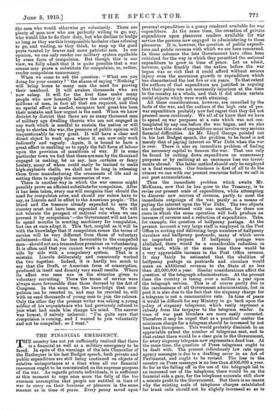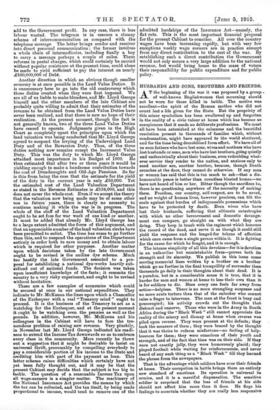THE FINANCIAL EMERGENCY.
Tilfcountry has not yet sufficiently realized that there .s a financial as well as a military emergency to be faced. In spite of the warnings of the late Chancellor of the Exchequer in his last Budget speech, both private and public expenditure are still being continued on objects of relative unimportance at a time when all our financial resources ought to be concentrated on the supreme purpose of the war. As regards private individuals, it is sufficient at this moment to urge once more the folly of the too common assumption that people are entitled in time of war to carry on their business or pleasure in the same manner as in time of peace. Every penny saved upon
personal expenditure is a penny rendered available for war expenditure. At the same time, the cessation of private expenditure upon pleasures renders available for war service the persons now engaged in administering to those pleasures. It is, however, the question of public expendi- ture and public revenue with which we are here concerned. In these columns the late Government have often been criticized for the way in which they permitted the national expenditure to grow in time of peace. Let us admit, however, quite frankly that the nation before the war began was so rich that it could afford without serious injury even the enormous growth in expenditure which has characterized the last five or six years. To that extent the authors of that expenditure are justified in arguing that their policy was not necessarily injurious at the time to the country as a whole, and that it did attain certain social objects which were worth attaining. All these considerations, however, are cancelled by the fasts of the war, and the authors of the high rate of pre- war expenditure probably now feel regret that they did not proceed more cautiously. We all of us know that we have to spend on war purposes at a rate which was not con- templated by any one before the war began, and we also know that this rate of expenditure must involve very serious financial difficulties. As Mr. Lloyd George pointed out in his last Budget speech, the problem to be faced is not merely that of paying interest on War Debt when the war is over. There is also an immediate problem of finding the necessary capital to finance the war. That can only be found by cutting down expenditure on unnecessary purposes or by realizing at an enormous loss our invest- ments abroad. The latter method should only be employed as a final resource. Our business is first of all to do the utmost we can with our present resources before we call in our past accumulations.
Thus the immediate problem which awaits Mr. McKenna, now that he has gone to the Treasury, is to revise our present scale of expenditure, while attempting to discover new sources of revenue, partly to meet the immediate outgoings of the war, partly as a means of paying the interest upon the War Debt. The two objects are closely intertwined with one another, for there are cases in which the same operation will both produce an increase of revenue and a reduction of expenditure. Take, for example, the question of halfpenny postage. At the present moment a very large staff is employed in the Post Office in sorting and delivering large numbers of halfpenny circulars and halfpenny postcards, many of which serve no important purpose. If halfpenny postage were abolished, there would be a considerable reduction in this work, while at the same time there would be a very appreciable increase in the Post Office revenue. It may fairly be estimated that the abolition of halfpenny postage on postcards and circulars would mean an additional revenue to the State of no less than £2,000,000 a year. Similar considerations affect the question of the telegraph administration. At the present time the country is losing over a million a year upon the telegraph service. This is of course partly due to the carelessness of all Government administration, but in part it is also due to the fact that the sixpenny charge for a telegram is not a remunerative rate. In time of peace it would be difficult for any Ministry to go back upon the policy of sixpenny telegrams, which really represent a subsidy from the taxpayer to the telegram sender. In Lime of war past blunders are more easily corrected. Therefore it may be urged that as a practical matter the minimum charge for a telegram should be increased by not less than threepence. This would probably diminish to an appreciable extent the number of telegrams sent, and to that extent there would be a clear gain to the Government, for every sixpenny telegram now represents a dead loss. At the same time, the question of Press telegrams ought to be dealt with. The present ridiculously low rate upon agency messages is due to a drafting error in an Act of Parliament, and ought to be revised. The loss to the country on Press messages is no lees than £800,000 a year. So far as the falling off in the use of the telegraph led to an increased use of the telephone, there would be on the financial side a gain, for the telephone accounts still show a minute profit to the Government. But there is no reason why the existing scale of telephone charges established for trunk calls should not be slightly increased so as to add to the Government profit. In any case, there is less labour wasted. The telegram is in essence a clumsy scheme of intercommunication as compared with the telephone message. The latter brings sender and receiver into direct personal communication ; the former involves a whole chain of intermediaries, including finally a boy to carry a message perhaps a couple of miles. These reforms in postal charges, which could certainly be carried without popular resistance at the present time, could alone be made to yield sufficient to pay the interest on nearly £100,000,000 of Debt.
Another direction in which an obvious though smaller economy is at once possible is the Land Value Duties. It is unnecessary here to go into the old controversy which these duties created when they were first imposed. We are all of us liable to make blunders, and Mr. Lloyd George himself and the other members of the late Cabinet are probably quite willing to admit that their estimates of the revenue to be obtained from the Land Value Duties have never been realized, and that there is now no hope of their realization. At the present moment, though the fact is not generally known, two of the three Land Value Duties have ceased to operate. Judgments given in the High Court so completely upset the principles upon which the land valuation was being conducted that Mr. Lloyd George agreed to suspend the levying of the Undeveloped Land Duty and of the Reversion Duty. Thus, of the three duties nothing now remains except the Increment Value Duty. This was the duty to which Mr. Lloyd George attached most importance in his Budget of 1909. He then estimated that after two or three years it would be yielding enough to make a handsome contribution towards the cost of Dreadnoughts and Old-Age Pensions. So far is this from being the case that the estimate for the yield of the duty in the current year is only £50,000. Yet the estimated cost of the Land Valuation Department as stated in the Revenue Estimates is £534,000, and this does not cover the whole cost. Even if we accept the theory that the valuation now being made may be of some other use in future' years, there is clearly no necessity to continue making it while the war is in progress. The whole of the staff of the Land Valuation Department ought to be set free for war work of one kind or another. It must be added that already Mr. Lloyd George has to a large extent admitted the force of this argument, and that an appreciable number of thalami valuation clerks have been permitted to enlist. The time has come to go further than this, and to suspend the operations of the Department entirely in order both to save money and to obtain labour which is required for other purposes. Another matter upon which decisions taken by the late Government ought to be revised is the aniline dye scheme. Much too hastily the late Government assented to a pro- posal for establishing a national dye-works heavily sub- sidized out of national funds. The decision was taken upon insufficient knowledge of the facts; it commits the country to a very risky experiment, and ought to be revised without hesitation.
These are a few examples of economies which could be secured at once in our national expenditure. They indicate to Mr. McKenna the lines upon which a Chancellor of the Exchequer with a real "Treasury mind" ought to proceed. It is the business of the Treasury to act as a watchdog for the Exchequer, and at the present moment it ought to be watching even the pennies as well as the pounds. In addition, however, Mr. McKenna and his colleagues in the Cabinet will have to face the tre- mendous problem of raising new revenue. Very pluckily, in November last Mr. Lloyd George indicated hie readi- ness to extend the Income Tax downwards so as to embrace every class in the community. More recently he threw out a suggestion that it might be desirable to insist on universal thrift, presumably by compelling everybody to pay a considerable portion of his income to the State and crediting him with part of the payment as loan. This latter scheme raises difficulties which certainly have not yet been fully thought out, and it may be that the present Cabinet may decide that the subject is too big to tackle. The question of a reasonable Income Tax upon all wage-earners is a simpler matter. The machinery of the National Insurance Act provides the means by which the tax can be collected, and the tax itself, by being made proportional to income, would tend to remove one of the admitted hardships of the Insurance Act—namely, the fiat rate. This is the most important financial proposal for the present Cabinet to consider. All over the country wages have been increasing rapidly, but with very few exceptions weekly wage earners are in practice exempt from any direct contribution to the cost of the war. By establishing such a direct contribution the Government would not only secure a very large addition to the national revenue, but would bring home to the mass of voters their responsibility for public expenditure and for public policy.



































 Previous page
Previous page